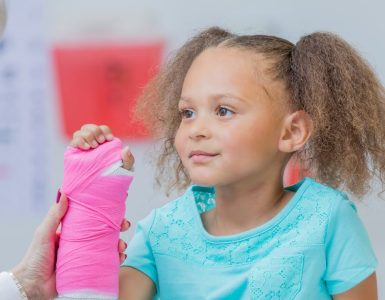June is National Safety Month. An important component of safety is being prepared. Summertime often means more time spent outside, which brings potential safety risks including injuries, cuts, and scrapes, sunburn and bug bites, among others. However, being prepared with a proper first aid kit to treat these minor yet common issues, you can relax and enjoy your summer knowing you are ready for anything.
Whether you buy a first aid kit or decide to make your own, there are a few essentials you should make sure are included.
Anytime essentials:
- Several different sizes of bandages
- Rubbing alcohol prep pads
- Hand sanitizer
- Sterile gauze pads
- ACE wraps
- A bandana that can be made into a quick sling
- Small scissors
- Tweezers (these can be helpful to remove foreign objects like ticks or splinters)
- Non-latex gloves (many people are allergic to latex)
- Antibiotic ointment to use on cuts
- Cotton balls
- Hydrocortisone cream to help lessen skin irritations
- Antiseptic wipes
- An on-the-go cold pack that can be used to reduce inflammation
- Oral thermometer
- Aspirin
Summertime-specific essentials:
- Sunscreen
- Lip balm with sunscreen/SPF
- Aloe, which is great for soothing sunburns
- An anti-itch lotion such as Calamine in case you encounter poison ivy
- Antihistamines to combat summer allergies
- Eye drops, to help with dry or itchy eyes brought on by allergies
- A small magnifying glass that can help you identify a tick on your skin
- Insect repellent, to keep away mosquitoes and other pests
In additional to the essentials, here are some other tips to ensure you’re even more prepared:
- Add your family’s other vital health information and supplies to your first aid kit:
- Contact information for all your doctors, including pediatricians, allergists, dentists, and other specialists Phone numbers for your local emergency service providers and a phone number to reach Poison ControlA written list of all prescription medications you and your family members currently take; also note on this list which medications, if any, you or your family members are allergic to
- Any prescribed or over-the-counter medications your family regularly takes, including epinephrine/Epi-Pens, antacids, pain relievers, etc.
- Keep all your first aid kit materials in one container, like a duffel bag that zips closed, and make sure to keep it out of direct sunlight.
- If you’re updating an existing first aid kit, don’t forget to check the expiration dates on any medications, creams, and other treatments that are already in your kit. If you find expired items, dispose of them safely and replace them with items that have not expired.
- Make sure everyone in your family knows where and how to access the first aid kit in case of an emergency.
Keep your kit handy at home or when traveling so you and your family can safely enjoy the fun all summer long!



